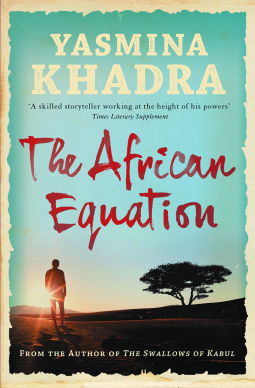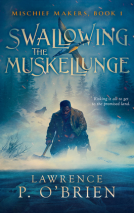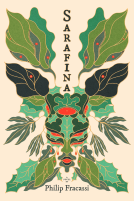
The African Equation
by Yasmina Khadra
This title was previously available on NetGalley and is now archived.
Send NetGalley books directly to your Kindle or Kindle app
1
To read on a Kindle or Kindle app, please add kindle@netgalley.com as an approved email address to receive files in your Amazon account. Click here for step-by-step instructions.
2
Also find your Kindle email address within your Amazon account, and enter it here.
Pub Date 15 Feb 2015 | Archive Date 13 Oct 2015
Description
Frankfurt MD Kurt Krausmann is devastated by his wife's suicide. Unable to make sense of what happened, Kurt agrees to join his friend Hans on a humanitarian mission to the Comoros. But, sailing down the Red Sea, their boat is boarded by Somali pirates and the men are taken hostage.
The arduous journey to the pirates' desert hideout is only the beginning of Kurt's odyssey. He endures imprisonment and brutality at the hands of captors whose failings are all too human.
As the situation deteriorates, it is fellow prisoner, Bruno, a long-time resident in Africa, who shows Kurt another side to the wounded yet defiant continent he loves.
A giant of francophone writing, Algerian author Yasmina Khadra takes current events as a starting point to explore opposing views and myths of Africa and the West, ultimately delivering a powerful message of friendship, resilience, and redemption.
Yasmina Khadra is the pen name of Mohammed Moulessehoul, a former Algerian army officer and now director of the Algerian Cultural Center in Paris. In November 2013, he announced his candidacy for the presidency of Algeria.
Advance Praise
A skilled storyteller working at the height of his powers --Times Literary Supplement
Like all the great storytellers of history, [Khadra] espouses the contradictions of his characters, who carry in themselves the entirety of the human condition. --Le Point
Available Editions
| EDITION | Paperback |
| ISBN | 9781908313706 |
| PRICE | £8.99 (GBP) |
Average rating from 14 members
Featured Reviews
 Sean T, Reviewer
Sean T, Reviewer
This book was good however I did find that the fear wasn't really part of this book. I was unable to see what happened and feel the uncertainty of life.
I think it needed to have some more power to it.
 Polly K, Reviewer
Polly K, Reviewer
Losing his wife to suicide is a hard blow for Kurt. Dealing with this life event leads to a sailing trip with a friend into African waters. An encounter with hostile terrorists leads to a hostage situation lasting for long weeks. For me, the difficulty with this book began early and I am not sure if it is due to the translation or the wandering style of the writer. The evolution of Kurt's feelings is well developed, but the story never seems believable. Ordinarily I would hesitate to rate a book as 2 stars, but this is my honest opinion.
 zeb k, Reviewer
zeb k, Reviewer
Once again, Khadra has written a book that could only be written by an African who understands how things work in an insurgency. Although he is North African (Algerian) Khadra was involved with fighting the Muslim Brotherhood during and after Algeria’s War of Independence. As a member of the Indigenous Police he dealt with members on a daily basis. They are little different in attitude from the Jihadis in Somalia.
There are three parts to the book, each almost a separate story. In the first part we meet Dr Kurt Krausmann (a general practitioner in private practice) who is trying to recover from the death of his wife. We learn about his life, marriage, business and medical practice. His friend Hans convinces him that he needs a sea voyage.
Kurt is both an industrialist and philanthropist, who is taking a ship (his own) full of medical aide and equipment for a humanitarian mission to the Comoro Islands. The islands are off the east coast of African, just northwest of the island of Madagascar. They sail through the Mediterranean and the Suez Canal, then down the Red Sea. Off the coast of Somalia (near Aden) their boat is taken over by Pirates, who throw their Filopino cook overboard.
In this second part, Kurt and Hans find themselves with their boat taken away and forced to live in a temporary camp. They end up in the hands of a small group of marauders who have to hide them from other larger groups. The Somalis realize that Hans could be worth a big ransom and go off to trade him to a bigger group. Kurt is left in captivity with a Frenchman (Bruno) from Djibouti, who has been held for over two years. Bruno is an old “African hand” and knows the ways of these rebels. With the majority of the group away with their “Captain”, they are left to the mercy of those left behind. These “leftovers” have no creed except to kill and pillage. They have no way of surviving except to fight as “Rebels”.
After many months in the captivity and being driving further and further into the desert, one night Kurt and Bruno are able to steal a truck and get away. The problem is they have no idea where they are or which way they should go. They end up wrecking the truck and hook up with a group of refugees and members of the International Red Cross (IRC). The IRC group is able to contact their embassies in Khartoum (they are in Darfur, Sudan).
The last part of the story is Kurt at back home in Frankfurt, Germany, dealing with the death of Hans (at the hands of the kidnappers) and his own “survivor’s guilt”. All through the book there are discussions between the characters as to the problems in and with Africa, and the people who live there are, and those who go there to do “good deeds”. It can be polemic, but well worth reading.
Zeb Kantrowitz zworstblog.blogspot.com zebsblog@gmail.com
 Trevor W, Reviewer
Trevor W, Reviewer
What an enjoyable novel.
This is the story of a man, distraught by the suicide of his wife, leaves his home town to assist with the setting up of a charity hospital in Africa. Things are never that simple though and the his kidnapping has a major impact on both his and his colleagues experiences.
I read a translated version of the story, into English from the original French, and the descriptions of life in the East Africa fsub-saraha let realistic and truthful - sometimes descriptions and feelings get lost in translation, in this case they did not.
My only disappointment with the story is how he was rescued, as this did not ring 100% true.
Well worth getting a copy to read.
I was given a copy of this book by the publisher in exchange for an honest review.
Another good book by Yasmina Khadra, this time we don't dwell with Muslims but with African pirates and kidnappers. The story of Kurt doesn't take a long span of time but it's so dense that it seems a bigger book than 300 pages more or less. The complications of a marriage life, the need to help, the delusion of knowing our spouse so well to remain astonish when something incredible happens. All this topics and more in this novel that gives a lot of food for thoughts.
Un altro bel libro di Yasmina Khadra, ma stavolta non abbiamo a che fare con i mussulmani, quanto piuttosto con i pirati somali, guerriglieri e rapitori. La storia di questo libro non prende tanto tempo ma é cosí densa che non sembra di aver letto solo 300 pagine (piú o meno). Le complicazioni della vita matrimoniale, il bisogno di aiutare chi ne ha bisogno, l'illusione di conoscere il nostro coniuge cosí bene che quando succede l'incredibile non riusciamo ad accettarlo. Tutti questi argomenti e molti di piú in questo libro che offre veramente molti spunti di riflessione.
THANKS TO NETGALLEY AND GALLIC BOOK FOR THE PREVIEW!
 Mandy J, Reviewer
Mandy J, Reviewer
Kurt Krausmann, devastated by a recent bereavement, is persuaded to join his friend Hans Makkeroth on a humanitarian mission to Africa. En route their boat is hijacked and they are taken hostage. Their captivity in harsh, inhumane conditions, plus the meeting with a fellow hostage Bruno, who staunchly continues to defend his aggressors’ behaviour in the context of African colonialism allows the author to explore many important issues, but unfortunately he really doesn’t manage to do so very effectively at all. My main problem with this book is the voices. Everyone speaks in eloquent sentences, even the African thugs. Now it may be, of course, that I am wrong and that some thugs are eloquent and articulate, but it seems unlikely. Khadra does indeed make one of them a poet but his actions belie any sense of humanity and education that being a poet usually implies. So the characters merely mouth Khadra’s own ideas and thoughts presumably in Khadra’s own voice and simply do not reflect the reality on the ground. And then Khadra’s own language is so high-flown and clichéd I could hardly bear to read it. Land of Morpheus, profile of a goddess, eyes shining like jewels or like “two rubies wrapped in velvet”, and even comparisons that don’t make sense – “his bulging, joyful eyes rolled like white-hot marbles”. And then there are the lists – every time a character walks into a room Khadra feels impelled to list all the contents…..”hard-cover encyclopaedias, numbered files in chronological order” and so on. What does that add to the narrative? Except superfluous words. There’s a good story lurking behind the bad style, and with some ruthless editing that story could have emerged. But as it stands the book has a lot wrong with it, which is a shame as the subject matter is relevant and topical and deserves a better treatment. By chance I’ve just read Clair Ni Chonghaile’s Fractured which sings while this one is mired in its own verbosity.
 Diane P, Educator
Diane P, Educator
It's not an easy read, yet, it's compelling. I forgot to write a review after I read the book, so I'm at a loss. Pirates. Kidnappers. Much violence.
 Kelsi H, Reviewer
Kelsi H, Reviewer
The disturbing story of a German doctor whose wife commits suicide. Grief stricken and at a loss for what to do next, he travels to meet his friend on a humanitarian mission and ends up in the captivity of Somali pirates. Algerian author Khadra (pen name of Mohammed Moulessehoul) shows us the dark side of Africa, but also one tinged with hope. Most of all, it is the story of redemption, using one man’s struggle to survive as a starting point to discuss the uneasy balance between Africa and the western world. Interesting take on current events, and powerful, although sometimes stilted, writing.













